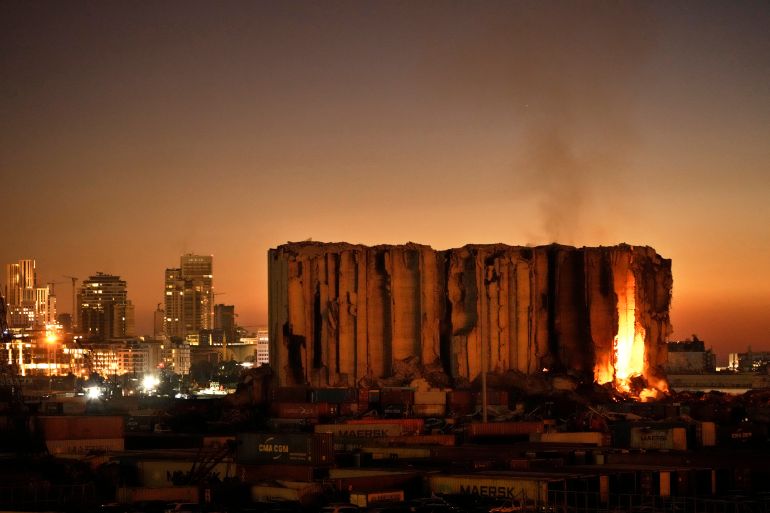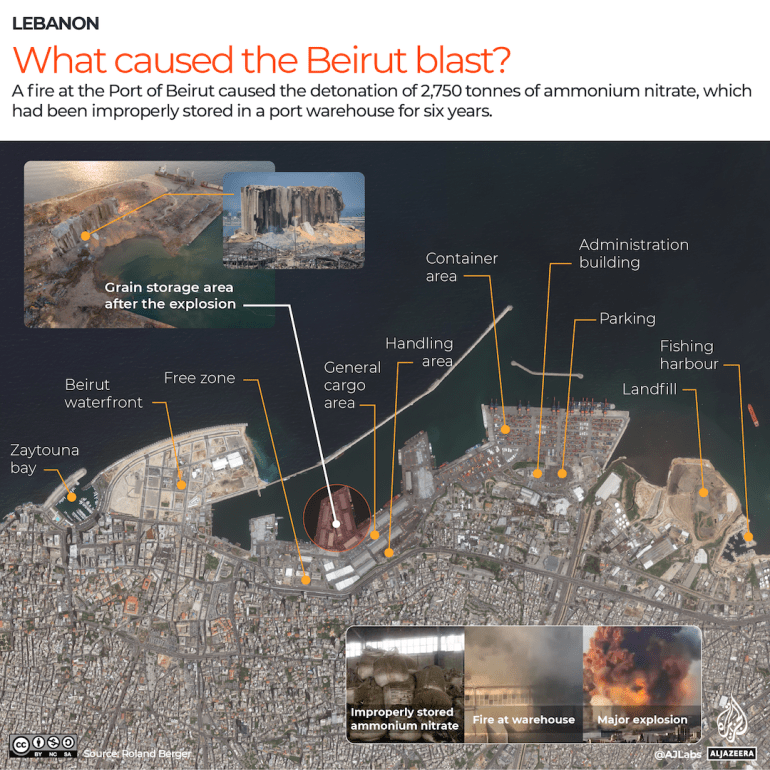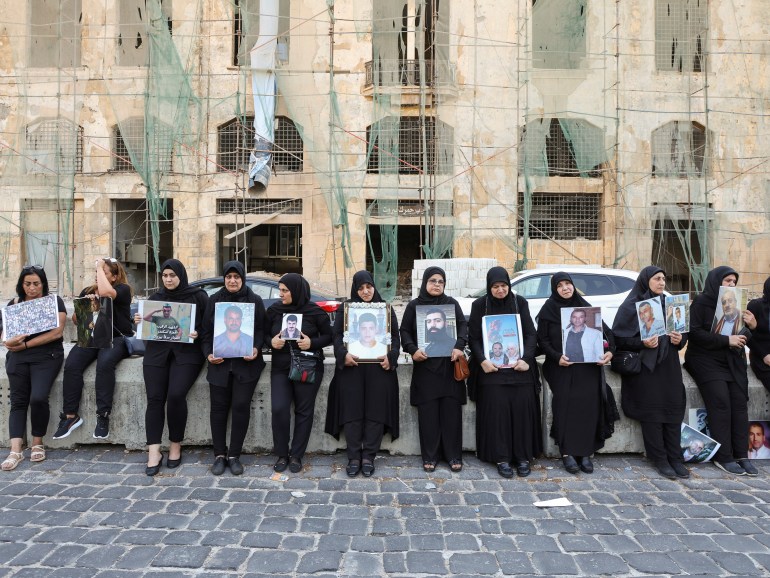Lebanon judge at the centre of Beirut blast inquiry showdown
Judge Tarek Bitar has faced intense opposition from Lebanon’s establishment since he resumed the investigation into the 2020 tragedy on Monday.

Beirut, Lebanon – Lebanese judge Tarek Bitar would have known that there would be pushback from the country’s ruling establishment to his surprise decision to resume the investigation into the 2020 Beirut port explosion.
Before the suspension of the investigation 13 months ago, those charged had mostly been low-level officials, but on Tuesday, it was revealed that Bitar had targeted a number of senior officials, with charges against Lebanon’s ex-prime minister and the chief prosecutor, among others.
Keep reading
list of 3 itemsLebanon on the brink: Is there hope for change?
Lebanon bank holdups: Who is the real criminal?
The chief prosecutor, Ghassan Oweidat has fired back, stating that the inquiry was still suspended by law and that he would notify security forces to not abide by Bitar’s orders.
He even summoned Bitar for questioning on Thursday.
“Instead of me appearing before him, he’ll be appearing before me,” Bitar was reported as saying.
Whichever way the investigation now goes, it is clear that Bitar faces entrenched opposition to his investigation into the Beirut port explosion, which killed at least 218 people on August 4, 2020.
The investigation into one of the largest non-nuclear explosions in history has been stalled since late December 2021 due to legal complaints against Bitar – filed on behalf of top officials who had been summoned for questioning – which could not be ruled on due to the retirement of judges who were not replaced.
Since the resumption of Bitar’s investigation, the Lebanese establishment does not appear to be cooperative, according to Aya Majzoub, Amnesty International’s deputy regional director for the Middle East and North Africa.
“It’s clear they’ve already taken a decision not to move the investigation forward, without really engaging with the legal analysis Bitar presented,” Majzoub said.
That view was backed up by Nizar Saghieh, a lawyer and founder of The Legal Agenda advocacy group.
Saghieh described Oweidat’s actions as “totally unacceptable”.
“Since the beginning [of the investigation], he said he’s not going to intervene in any way … due to a conflict of interest,” Saghieh said.
“Now that he is charged, he takes this back and he starts accusing the judge in reply … It’s a very vindicative act.”
Oweidat did not comment on the case when approached by Al Jazeera.
Majzoub said there was now a “tug of war” between Bitar and the people he has charged, as well as the establishment.
“[The fact that Oweidat has been charged] gives you a glimpse of the conflict of interest in the Lebanese system where a person charged in the investigation can decide whether or not the investigation goes forward,” Majzoub said.

Time to be ‘audacious’
The resumption of Bitar’s investigation comes on the back of a legal interpretation that challenges the initial suspension.
While it is unclear how long Bitar has been planning the resumption of the case, it seems clear that he is willing to abandon caution.
Saghieh says it has become necessary to be more audacious in interpreting the law.
“Before he was staying [quiet] and waiting, now he has made such interpretations. It means he’s going into some kind of confrontation,” Saghieh said.
For Saghieh, Bitar’s move is a welcome one.
“[Through Bitar’s actions, he is] saying: ‘I will continue my job until the end, whatever the risk’, and I think there is a risk on his life, because this kind of issue is not easy,” Saghieh said.
“There are lots of powerful people who will not allow him to do his job.”
There has already been a violent response to Bitar’s investigation. In October 2021, Beirut saw deadly clashes following a protest against Bitar organised by Hezbollah and its allies.
Such events may not happen this time around, as opponents believe there is a consensus among Lebanon’s political elite to keep the investigation stalled.
Al Jazeera was told by the Hezbollah press officer that the leadership would not comment on the work of Bitar.
According to local media reports, Oweidat, who is the top public prosecutor in Lebanon working in the Court of Cassation – what is effectively the Supreme Court – had overseen an internal security forces investigation into cracks in the warehouse where the ammonium nitrate was stored before the explosion.

Possibilities to move to indictments
The cooperation of the security forces is important in ensuring that legal summons and arrest warrants are delivered.
But if previous experience is anything to go by, that cooperation may not be forthcoming.
If the establishment continues to not comply, or those summoned do not show up for questioning, Bitar may consider them fugitives, and, if satisfied that he has gathered as much evidence as he can within the restraints of the investigation, move ahead to release his indictments based on the information he has.

Majzoub said the public would then be able to see the evidence presented against the figures charged.
“I think if Bitar manages to release his indictment, I think that will be a very positive thing for at least the right to the truth,” Majzoub said.
Even if the judicial council does not move the case to trial following an indictment, the evidence released would assist prosecutors in other countries, such as France and Germany, which have ongoing criminal cases following the death of their nationals in the explosion.
Accountability Now president and victims’ co-counsel Zina Wakim stressed that proceedings abroad will rely on Bitar’s investigations and that there was still a push for a United Nations fact-finding mission.
“The very design of any institution [in Lebanon] was made to maximise opacity, dilute responsibilities, and hence ensure impunity for the corruption of the political elite,” Wakim told Al Jazeera.
“In our view, the victims of the blast have no other option but to circumvent the muzzling of the judiciary by initiating proceedings outside of Lebanon.”
And while Bitar may be unable to push through his investigation, the news of his attempts has been welcomed by family members of the victims of the port tragedy.
As the investigation drags on, protests by family members have grown more desperate, which has led to the questioning – and even an arrest – of victims’ relatives earlier this month.
Tania Daou-Alam, a lawyer, was by her husband’s side when he died in the blast, which occurred after ammonium nitrate improperly stored at the port exploded, causing damage to large parts of the city.
She believes that the resumption of the investigation is promising, but that Bitar will be met “aggressively”.
“Every step forward in exposing the guilty parties and the obstructionists is a step forward in fighting impunity,” Daou-Alam told Al Jazeera.